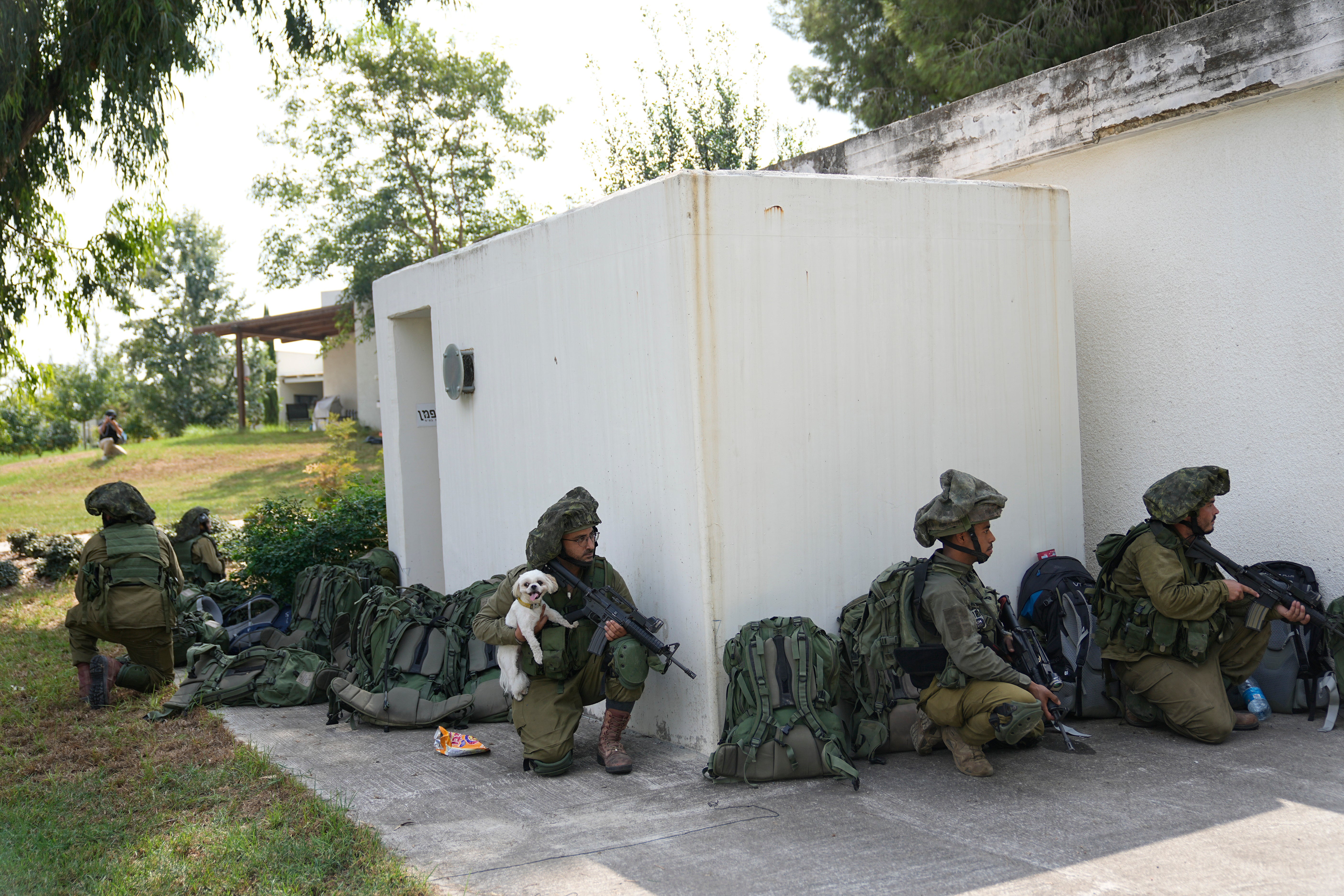Why a ground attack on Gaza by Israeli troops now appears inevitable
Israel’s military has laid out the extent to which troops at the border were caught unaware by the Hamas attack that the IDF says left dozens killed in their beds, writes Kim Sengupta. As Israeli air strikes continue to hit Gaza, a ground offensive is likely to come next


Troops at the Gaza border were caught unawares and “slaughtered by the dozens in their beds” by Hamas as 11 military bases were overrun as a result of the lethal and massive Israeli intelligence failure over the raid.
More than 60 soldiers were killed in the first hours of the coordinated assault after drones were used to destroy state-of-the-art surveillance systems, with the numbers expected to rise as identities are established. A police station with communication equipment had to be blown up by Israeli forces after it had been captured by Islamist fighters.
Around an estimated 130 Israelis have been abducted and taken into Gaza by Hamas. The exact numbers are not known, said Major Nir Dinar, an Israeli army officer, due to difficulties with identification.
“The problem we face is that the bodies are in an unrecognisable situation because they were murdered and then set on fire. The terrorists burned bodies after butchering them. So many of the bodies are unidentifiable. We have notified 50 families as of this day about the fact that we know that their loved ones were kidnapped. I understand that people want answers, but it's difficult to gather information”, he said.
Hamas, said Major Dinar, had succeeded in what they had been trying for 20 years. “They did a good job, they got us,” he acknowledged. “We have never seen such a successful attempt by Hamas to come into Israel to murder and kidnap civilians and soldiers. Dozens of soldiers slaughtered in their beds. They didn't even have the time to wake up. And then the terrorists went to the communities, killed people in wheelchairs and kids.”
The assault last weekend came after the 50th anniversary of the Yom Kippur War in which Israel was also caught by surprise when Arab states attacked on multiple fronts, Major Dinar pointed out. “To this day we have asked ourselves: how did [the] Yom Kippur War happen? And now we have this from Hamas. It was well established, very well planned. And now we have to strike back,” he said.
A ground attack on Gaza now seems inevitable, on an even more destructive scale than the 2014 Gaza War in which more than 2,205 Palestinians were killed, including 1,483 civilians, according to the UN, along with 71 Israelis – 66 of them soldiers– in 50 days of fighting.
The mission would be further complicated, this time, by the presence of hostages who may get injured or killed in the fighting. There is said to be a debate within Israel’s military and intelligence circles on how it should be conducted with calls for surgical operations by special forces to rescue the captives.
Maj Dinar, who has served with special forces in the past, claimed that was not a feasible option: “When we had a soldier kidnapped in Gaza in 2006, there was talk about ‘why don’t you send in your elite units into Gaza to bring him back?’. Well if we could, we would have done that. Look at how many hostages we are looking at now.”
The abducted soldier, Gilad Shalit, was held for five years in Gaza, released in 2011 as part of a prisoner swap deal.
Hamas has claimed that four of the hostages have been killed in Israeli bombing. They have threatened that they would kill captives in response to Israeli bombing of civilians without warning.
Gaza’s health ministry said 900 people have been killed in the territory since the Israeli air strikes began.
The Israeli military normally sends messages to residents in areas where air strikes have taken place. Deaths have resulted, however, from messages arriving too late, or confusion over the locations of bombings.
Abu Ubaida, a spokesman for Hamas’s armed wing, said in an audio statement “We have decided to put an end to this and as of now, we declare that any targeting of our people in their homes without prior warning will be regrettably faced with the execution of one of the civilians we are holding.”
The Israeli government has announced that having seized back areas at the border which had been taken over by Hamas, the military will go into an offensive phase. Brigadier General Dan Goldfuss told the media: “We have all kinds of different capabilities and angles. We will have to change the reality in Gaza so that this does not happen again.”
Hamas has declared that it has enough weaponry to defend Gaza and take the war back to Israel. After warning residents in Ashkelon across the border the Islamist group fired missiles into the city on Tuesday afternoon. Uzi Rubin, regarded as the founder of Israel’s missile programme, has pointed out that Qassam missiles in Hamas’s arsenal cost between $300 and $800 each. The cost of intercepting the missiles by the country’s Iron Dome defence system is estimated to be $100,000 per missile.
The Israeli military maintains it is confident about embarking on a ground war. Major Dinar said: “We’ll see who wins. I'm sure you know who it is. Unfortunately, this will cause many, many casualties on both sides.”
Join our commenting forum
Join thought-provoking conversations, follow other Independent readers and see their replies
Comments
Bookmark popover
Removed from bookmarks